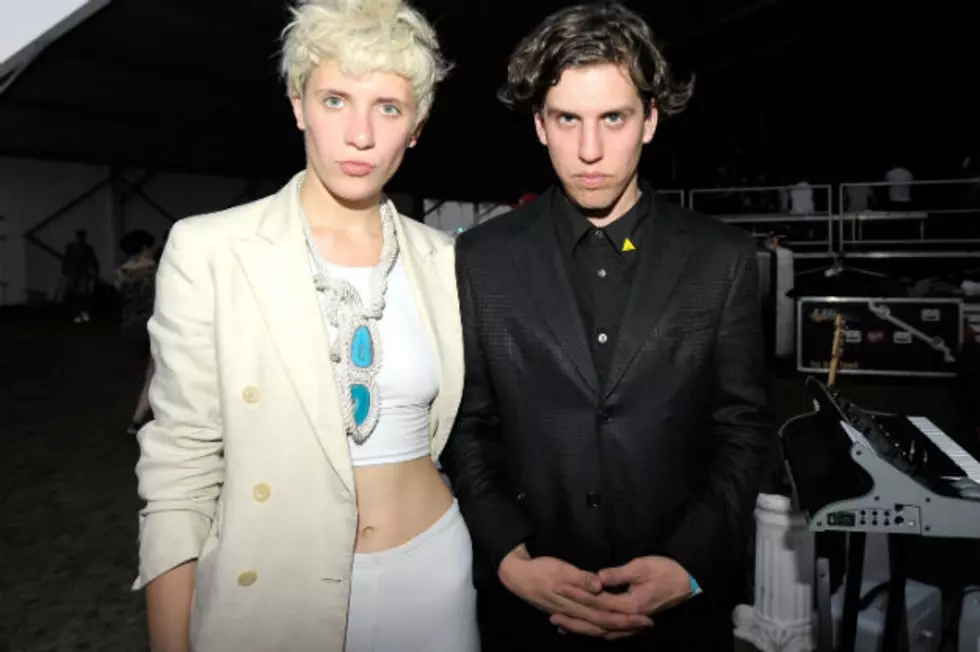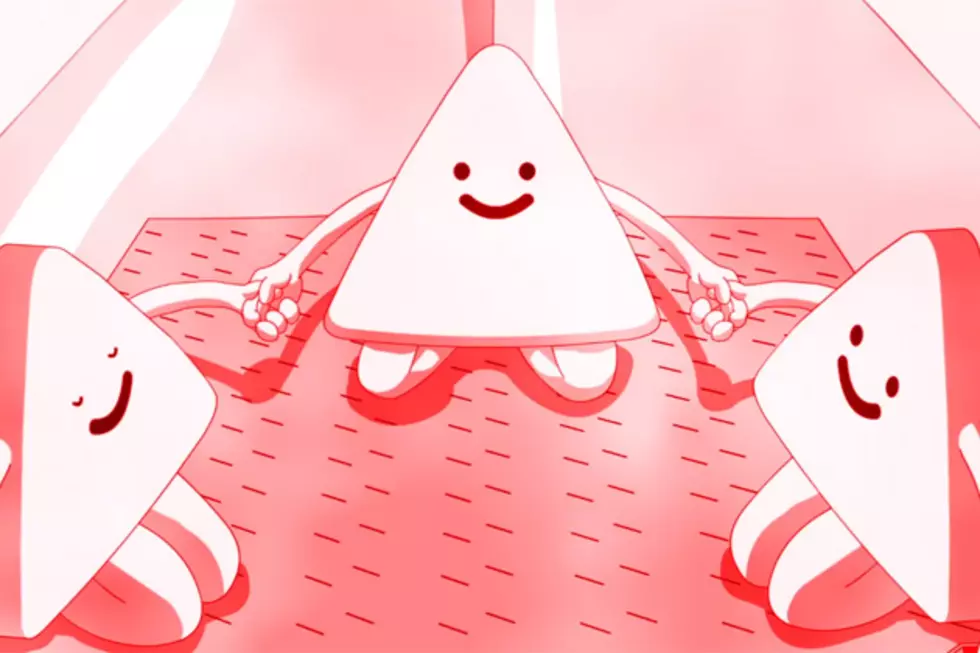
YACHT Talk Mystery, Mantras and Out-of-Body Experiences – Exclusive Interview
YACHT [always all caps, sometimes with a triangle (Y△CHT)] are a band, belief system and business based out of Portland, Ore., composed around core members Jona Bechtolt and Claire L. Evans. Signed with cool-as-hell label DFA, the band has forged a cerebral brand of electro-pop, rife with references of utopia and psychic cities. Primal and intellectual, serious and absurd, YACHT shows are outsized experiments in collective experience. Lucky for you, they begin a U.S. tour today, and Evans swapped notes with Diffuser.fm while the band was in Europe. Enjoy.
You've declared that YACHT are a band, belief system and business. Can you unpack those three?
We say YACHT is a band, business and belief system in the interest of total transparency. YACHT is all of these things in equal measure. The band part is self-evident, I guess, and the business is because we want to keep the money aspect of what we do out in the open -- a lot of people, it seems, have this idea of artists as being somehow separate from the economy, when really we're all trying to make a living while maintaining the integrity of our work. As for the belief system, we have a personal philosophy that we delineate clearly to fans, if they're interested. It's not dogmatic, it's just a set of ideas that are intimately connected to our music.
You joined up with Jona after a mystical experience in the Far West Texas desert. What happened? How did it affect you? Is that the most transcendent experience you've had? If not, what was it?
Jona and I started working together after we saw the "mystery lights" of Marfa, Texas, a paranormal optical phenomenon that's existed in the desert out there since as long as there have been people to perceive it -- and, presumably, beforehand. It was not necessarily the most transcendent experience of our lives -- that's our secret -- but it was our first contact with an irrefutable mystery. The people in Marfa live side-by-side with this ancient and unexplained light phenomenon, and it affects their perceptions of reality. As push-button kids of the 21st century, we'd never encountered anything without an answer, and we found that extremely compelling. Experiencing the Mystery Lights made us realize how important mystery was, how essentially all the great artistic and spiritual accomplishments of our race were made when the universe was still totally unknown, when astrology was astronomy, before magic became medicine, science and knowledge. So we set out about to make work that explored and addressed that.
So, YACHT stands for “Young Americans Challenging High Technology.” How are you doing that?
It's "challenge" in the sense of engagement, not combat. We like to push technology to the limits of its design, hoping to use software for unanticipated ends. We make images in video programs, build video in Power Point, and generally use the computer like a punk rock instrument.
You mention the philosopher Baruch Spinoza on the website. So what is your idea of "God," and how does it relate to his?
Spinoza argues that there is only one thing, substance, and it's totally infinite, self-caused and eternal. He calls it "God," or sometimes "Nature"; we call it the universe. In our view, while the universe is vast and indifferent, we are also intrinsically part of it -- like Carl Sagan said, we're "made of star-stuff." If it's infinite and expanding, then any single individual can call his or herself the center. This can be either terrifying or radically empowering. We choose the latter.
In your recommended mantras flyer, you observe that "'pop music is designed for repeat play, and dance music is structured by rhythmic repetition. Why not consider the mantra as a kind of cosmic pop music?" This is awesome. Are mantras really cosmic pop music? Which mantra connects with you most and why?
Of course they are. A pop song and a mantra operate in much the same way, employing the phenomenon of semantic satiation: that moment when words lose meaning and become just sounds. By drumming a sound into your body and mind, whether by hitting "repeat" on your favorite pop track or sitting down to recite your mantra, you're creating a neurological pathway dedicated to the feeling the words are intended to engender. It's powerful. My mantra is secret.
If YACHT's music was made manifest in the form of super heroes, what powers would they have?
The power to spontaneously generate empathy in others.
What's a spiritual experience you've had with dance or pop music?
I wept at a Rapture show in London last year. And at a Black Dice show in the early 2000s, I'm fairly certain I floated above my own body for a full 10 minutes.
How is live music so successful at creating moments of collective feeling? Why do you encourage people to act on impulse? What's the motivation?
Music is both inherently human and inherently collective. Cause and effect might be irrelevant here, too, as humans are also inherently collective. But music is central to every human culture; there are instruments dating back to 50,000 B.C, and the cognition of rhythm is an evolved trait unique to humans. Music is religious, martial, social, celebratory, a tool for bonding together groups of people all the way back to the earliest campfires of mankind. In our striated sub-culture driven scene, we often forget this truth, perceiving music as an extremely individualist pursuit, something that can define a person as "unique" or separate from others--but ultimately everyone wants to lose their minds in a group, surrounded by sounds and rhythm. That's the impulse, which goes deep.
Can you summarize YACHT’s personal philosophy? How it is connected to your music?
There are myriad micro-points to the YACHT philosophy -- the belief in extraterrestrial life, the support of open information, an awareness of the multiplicity of reality -- but the underlying thing is simple self-empowerment and acceptance. If we live in an infinite and indifferent universe, then every single person can be at the center. If we accept that religion, science, and art all strive to answer the same fundamental questions about the nature of being (albeit in different languages), then we can understand the dogma of others, even relate. We are irrelevant specks of carbon on a rock in the void, and this can be horrifying or empowering. We choose the latter, and encourage people to completely script their own realities, and release themselves from all fear of judgment -- human or Godly.
Our fascination with mystery may seem ill-placed, since we actually tend to overwhelm the public with information. But the music, the text, the images all come from the same fountainhead of pure creative experience, which is by definition both mysterious and mystical. The creative act itself, the making of something from nothing: It's as close to magic as any earthly being can experience. We take it seriously, and we don't try to parse it into component parts; it's why we hate the question "what inspires you?"
As for technology, we see it as a tool, a way to transmute the initial idea into something with a body -- and then to disseminate it.
Are you finding any time to write or record while on the road? How can we expect the sound of YACHT to grow?
We have a hard time recording on the road; we really throw ourselves into the shows, and there isn't much left after that focused collective experience. Recording albums, for us, takes a concentrated separateness. We tend to take several months off and go out to the desert and work. To be honest, we don't know what's next, but I can tell you that it will be very different; we're going to try new forms, new mediums.
What's the relationship between live music and shamanism? Is a YACHT show a shamanic experience?
Sure, the shamanic experience is inseparable from music. In most shamanic traditions, the song is more central to the disembodiment of its participants than whatever the psychedelic medium being used is. The interesting thing about sound is that it's both mental and tactile; auditory information is perceived both inside and outside the body. It's both internal and shared, like any great spiritual thing. We strive to convey that with live shows, encouraging altered states of all kinds, pushing physical contact, building sonic environments that ramp and envelop, but ultimately it's up to the user to take the step into themselves. You know, like Dennis Leary said, we make the set and setting.
Watch the YACHT ‘Shangri-la’ Video
More From Diffuser.fm









